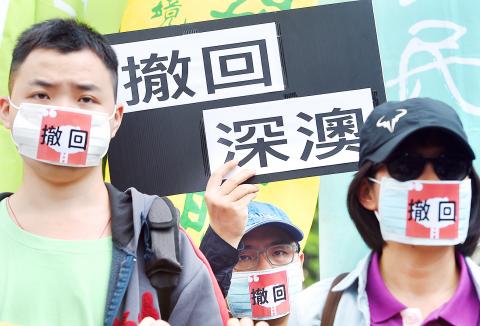A number of environmental groups yesterday protested outside the Executive Yuan in Taipei to demand that the government withdraw its plan to open the rebuilt coal-fired Shenao Power Plant in New Taipei City.
About 50 people from organizations including the Green Citizens’ Action Alliance, Greenpeace, the Homemakers United Foundation and Citizen of the Earth, Taiwan carried signs reading “Withdraw” and demanded that a representative of the Cabinet come out and face the crowd.
Tsai Ya-ying (蔡雅瀅), an attorney with the Wild at Heart Legal Defense Association, criticized the process by which the Environmental Protection Administration’s (EPA) Environmental Impact Assessment Committee conducted the review that led to the decision to expand and open the power plant.

Photo: Liao Chen-huei, Taipei Times
The process was flawed on many counts, Tsai said, including the many alterations to the proposal made by state-run utility Taiwan Power Co which had made it necessary for the project to be re-evaluated.
Many of the protesters were concerned about the effects that the two 600 megawatt generators would have on the public’s health and the environment.
Yi Jo-lan (衣若蘭), a mother and resident of Shenao, said the power plant, which has yet to reopen, had severely affected the health of people living close to it in the past few decades.
She said many of her friends and neighbors have died as a result and as a mother it was her responsibility to protect her child.
Researchers from environmental groups also questioned the government’s rationale for wanting to open the power plant, arguing that its coal-fired generators would generate more carbon emissions than a natural gas-fired power plant.
Department of Economics, Energy and Agriculture official Liao Yaw-chung (廖耀宗) accepted the protesters’ petition on behalf of the Cabinet.
Meanwhile, the New Power Party held a news conference to voice its opposition to the project, with some of its candidates for city and county councilor seats in November’s local elections asking President Tsai Ing-wen (蔡英文) to scrap the project.
Lin Jui-wen (林瑞文) and Chen Chih-ming (陳志明), who are running for council seats in Yilan County and New Taipei City respectively, were worried about the impact the plant would have on the environment, including consequences the government “may not fully comprehend.”
Chen asked the government to re-evaluate the project and propose an alternative that would be more beneficial to the health of local residents.
EPA Minister Lee Ying-yuan (李應元) reacted to the protest and a Greenpeace survey that showed that 75 percent of northern Taiwan residents were opposed to the plan by saying the relevant government agencies should try harder to communicate and explain the project to the public.
Defending the government’s decision, he said the two ultra-supercritical generators to be installed at the power plant would emit carbon at levels that comply with international standards.
The opinions of environmental groups would make government agencies even more keen to protect the environment as they go ahead with the project, Lee said.

Beijing could eventually see a full amphibious invasion of Taiwan as the only "prudent" way to bring about unification, the US Department of Defense said in a newly released annual report to Congress. The Pentagon's "Annual Report to Congress: Military and Security Developments Involving the People's Republic of China 2025," was in many ways similar to last year’s report but reorganized the analysis of the options China has to take over Taiwan. Generally, according to the report, Chinese leaders view the People's Liberation Army's (PLA) capabilities for a Taiwan campaign as improving, but they remain uncertain about its readiness to successfully seize

Taiwan is getting a day off on Christmas for the first time in 25 years. The change comes after opposition parties passed a law earlier this year to add or restore five public holidays, including Constitution Day, which falls on today, Dec. 25. The day marks the 1947 adoption of the constitution of the Republic of China, as the government in Taipei is formally known. Back then the Chinese Nationalist Party (KMT) governed China from Nanjing. When the KMT, now an opposition party in Taiwan, passed the legislation on holidays, it said that they would help “commemorate the history of national development.” That

Trips for more than 100,000 international and domestic air travelers could be disrupted as China launches a military exercise around Taiwan today, Taiwan’s Civil Aviation Administration (CAA) said yesterday. The exercise could affect nearly 900 flights scheduled to enter the Taipei Flight Information Region (FIR) during the exercise window, it added. A notice issued by the Chinese Civil Aviation Administration showed there would be seven temporary zones around the Taiwan Strait which would be used for live-fire exercises, lasting from 8am to 6pm today. All aircraft are prohibited from entering during exercise, it says. Taipei FIR has 14 international air routes and

Snow fell on Yushan (Jade Mountain, 玉山) yesterday morning as a continental cold air mass sent temperatures below freezing on Taiwan’s tallest peak, the Central Weather Administration (CWA) said. Snowflakes were seen on Yushan’s north peak from 6:28am to 6:38am, but they did not fully cover the ground and no accumulation was recorded, the CWA said. As of 7:42am, the lowest temperature recorded across Taiwan was minus-5.5°C at Yushan’s Fengkou observatory and minus-4.7°C at the Yushan observatory, CWA data showed. On Hehuanshan (合歡山) in Nantou County, a low of 1.3°C was recorded at 6:39pm, when ice pellets fell at Songsyue Lodge (松雪樓), a